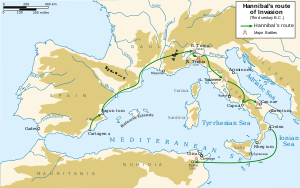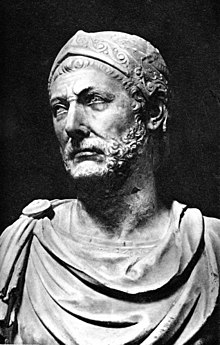Hannibal's crossing of the Alps
| Hannibal's crossing of the Alps | |||||||
|---|---|---|---|---|---|---|---|
| Part of the Second Punic War | |||||||
 Hannibal's route to Italy |
|||||||
|
|||||||
| Belligerents | |||||||
| Roman Republic | Carthage | ||||||
| Commanders and leaders | |||||||
|
Publius Cornelius Scipio Tiberius Sempronius Longus |
Hannibal Hasdrubal Mago Hasdrubal Gisco Syphax Hanno the Elder Hasdrubal the Bald Hampsicora Maharbal |
||||||
| Strength | |||||||
| 94,000+ | |||||||
| Casualties and losses | |||||||
| 68,000+ | |||||||
| Hannibal |
|
|---|---|

A marble bust, reputedly of Hannibal. Found in Capua
|
Hannibal's crossing of the Alps in 218 BC was one of the major events of the Second Punic War, and one of the most celebrated achievements of any military force in ancient warfare. Bypassing Roman and allied land garrisons and Roman naval dominance, Hannibal managed to lead his Carthaginian army over the Alps and into Italy to take the war directly to the Roman Republic.
After the final Carthaginian naval defeat at the Aegates Islands, the Carthaginians surrendered and accepted defeat in the First Punic War.Hamilcar Barca (Barca meaning lightning), a leading member of the Patriotic party in Carthage and a general who operated with ability in the course of the First Punic War, sought to remedy the losses that Carthage had suffered in Sicily to the Romans. In addition to this, the Carthaginians (and Hamilcar personally) were embittered by the loss of Sardinia. After the loss of the war to the Romans, the Romans imposed terms upon the Carthaginians that were designed to make Carthage a tribute-paying city to Rome and simultaneously strip it of its fleet. While the terms of the peace treaty were harsh, the Romans did not strip Carthage of her strength; Carthage was the most prosperous maritime trading port of its day, and the tribute that was imposed upon them by the Romans was easily paid off on a yearly basis while Carthage was simultaneously engaged by Carthaginian mercenaries who were in revolt.
The Carthaginian patriot party was interested in conquering Iberia, a land whose variety of natural resources would fill its coffers with sorely needed revenue and replace the riches of Sicily that, following the end of the First Punic War, were now flowing into Roman coffers. In addition, it was the ambition of the Barcas, one of the leading noble families of the patriotic party, to some day employ the Iberian peninsula as a base of operations for waging a war of revenge against the Roman military alliance. Those two things went hand in hand, and in spite of conservative opposition to his expedition, Hamilcar set out in 238 BC to begin his conquest of the Iberian peninsula with these objectives in mind. Marching west from Carthage towards the Pillars of Hercules, where his army crossed the strait and proceeded to subdue the peninsula, in the course of nine years Hamilcar conquered the southeastern portion of the peninsula. His administration of the freshly conquered provinces led Cato the Elder to remark that "there was no king equal to Hamilcar Barca."
...
Wikipedia
